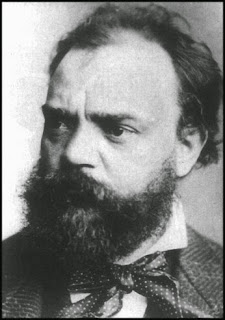Information
Composer: Antonín Dvořák
- Piano Trio No. 3 in F minor, Op. 65: 1. Allegro ma non troppo
- Piano Trio No. 3 in F minor, Op. 65: 2. Allegretto grazioso, meno mosso
- Piano Trio No. 3 in F minor, Op. 65: 3. Poco adagio
- Piano Trio No. 3 in F minor, Op. 65: 4. Finale. Allegro con brio
- Piano Trio No. 4 in E minor "Dumky", Op. 90: 1. Lento maestoso - Allegro
- Piano Trio No. 4 in E minor "Dumky", Op. 90: 2. Poco adagio - Vivace
- Piano Trio No. 4 in E minor "Dumky", Op. 90: 3. Andante - Allegretto
- Piano Trio No. 4 in E minor "Dumky", Op. 90: 4. Andante moderato, quasi tempo di marcia - Tempo I
- Piano Trio No. 4 in E minor "Dumky", Op. 90: 5. Allegro
- Piano Trio No. 4 in E minor "Dumky", Op. 90: 6. Lento maestoso - Vivace
Florestan Trio
Anthony Marwood, violin
Richard Leste, cello
Susan Tomes, piano
Date: 1996
Label: Hyperion
Label: Hyperion
------------------------------------------------------------------
A favourite and appropriate pairing – Dvorak’s most passionate chamber work in harness with one of his most genial. The F minor Piano Trio (1883) was contemporaneous with the death of Dvorak’s mother; it anticipates something of the storm and stress that characterizes the great D minor Seventh Symphony (1884-5) and I am happy to say that the Florestan Trio serve it well. Sensitivity is the keyword, especially in those shaded groves – questioning bridge passages or tender asides – that border the windblown main trail. The phrasing ebbs and flows, reflecting on urgency rather than going all out to re-enact it (as Heifetz et al do on their RCA recording). Listen, for example, to cellist Richard Lester’s warm-toned statement of the first movement’s second set (2'16'' into track 1), the way violinist Anthony Marwood follows suit or the eerie darkening that greets the onset of the development section (try from, say, 4'09'' to 4'38''). All three players allow themselves plenty of expressive leeway and yet the musical line is neither distorted nor stretched too far. The second movementAllegretto is truly grazioso (so many players overstate the case here), and the qualifying meno mosso perfectly judged. And when it comes to Anthony Marwood’s sweet-centred projection of the Brahmsian melody 4'04'' into the Poco adagio, you’d be hard pressed to find a more sensitive performance. The finale is buoyant rather than especially rustic, whereas the more overtly colourful Dumky Trio inspires a sense of play and a vivid suggestion of local colour – 2'45'' into the third movement, for example, or 1'25'' into the fourth. Throughout the performance, the manifest ‘song and dance’ elements of the score (heartfelt melodies alternating with folk-style faster music) are keenly projected.
Reservations? Virtually none, save that I would have welcomed rather more drama in the F minor Trio’s first movement. The recordings are first-rate, so is Jan Smaczny’s annotation and I would say that if you’re after a subtle, musically perceptive coupling of these two works, then you could hardly do better.
-- Gramophone
More reviews:
BBC Music Magazine PERFORMANCE: ***** / SOUND: ***
http://www.amazon.com/Dvorak-Piano-Trios-Op-Dumky/dp/B000002ZYD
More reviews:
BBC Music Magazine PERFORMANCE: ***** / SOUND: ***
http://www.amazon.com/Dvorak-Piano-Trios-Op-Dumky/dp/B000002ZYD
------------------------------------------------------------------
Antonín Dvořák (September 8, 1841 – May 1, 1904) was a Czech composer. He was the second Czech composer to achieve worldwide recognition, after Bedřich Smetana. Following Smetana's nationalist example, many of Dvořák's works show the influence of Czech folk music, such as his two sets of Slavonic Dances, the Symphonic Variations, and the overwhelming majority of his songs. Dvořák wrote in a variety of forms: nine symphonies, ten operas, three concertos, several symphonic poems, serenades for string orchestra and wind ensemble, more than 40 works of chamber music, and piano music.
***
The Florestan Trio formed in 1995 in London, England. Its members included Anthony Marwood (violin), Richard Lester (cello), and Susan Tomes (piano). Lester and Tomes are former members of the piano quartet Domus. The Florestan Trio played together for sixteen years and established a reputation as one of the finest piano trios in the world. The Trio is one of the most-recorded piano trios in the world; their recordings for Hyperion have received outstanding reviews, and all their discs have been nominated for Gramophone Awards. Their final series of concerts was given at the Wigmore Hall in London in January 2012.
http://www.allmusic.com/artist/florestan-trio-mn0001398686
http://www.allmusic.com/artist/florestan-trio-mn0001398686
------------------------------------------------------------------
FLAC, tracks
Links in comment
Enjoy!



This comment has been removed by the author.
ReplyDeleteThanks!
ReplyDeleteAppreciated !
ReplyDeleteMegathanks
ReplyDeleteThis comment has been removed by the author.
ReplyDeletePlease respost. Broken link.
Delete¡Muchas gracias, Ronald Do!
ReplyDeleteChoose one link, copy and paste it to your browser's address bar, wait a few seconds (you may need to click 'Continue' first), then click 'Skip Ad' (or 'Get link').
ReplyDeleteIf you are asked to download or install anything, IGNORE, only download from file hosting site (mega.nz).
If MEGA shows 'Bandwidth Limit Exceeded' message, try to create a free account.
http://caneddir.com/4eXT
or
https://uii.io/7Z1t
or
https://exe.io/FRMRf
Thank you!
ReplyDelete